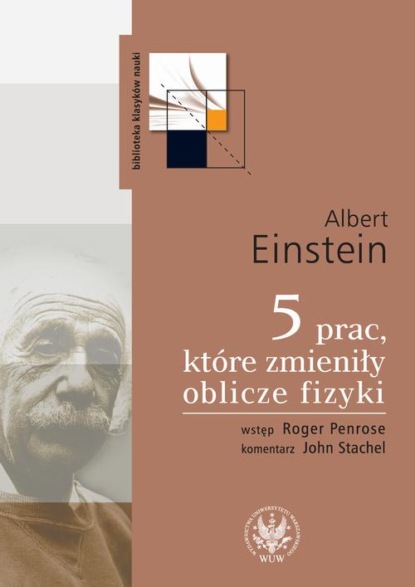Umfang 7 Seiten
0+
Über das Buch
Niniejszy tom zawiera 5 artykułów, które Albert Einstein opublikował w pamiętnym 1905 roku. Prace te raz na zawsze zmieniły nasze poglądy na naturę czasu, przestrzeni i światła, autorowi zaś przyniosły sławę:
- Rozprawa o nowej metodzie określania rozmiarów molekuł stała się w końcu jedną z najczęściej cytowanych prac Einsteina, choć nie dotyczy teorii względności.
- Artykuł wyjaśniający ruchy Browna zawierał nowatorskie koncepcje fizyczne, ale także konkretne przewidywania. Za ich doświadczalne potwierdzenie inny uczony, Francuz Jean Perrin, otrzymał w 1926 r. Nagrodę Nobla.
- Najbardziej znana praca, O elektrodynamice ciał w ruchu, pogrzebała czas absolutny, podniosła do rangi fundamentalnej stałej fizycznej prędkość światła c i w ten sposób zapoczątkowała fizykę relatywistyczną.
- Czwarty, najkrótszy artykuł zawierał wyprowadzenie najsłynniejszego wzoru na świecie: E=mc2.
- Einstein uważał za prawdziwie rewolucyjną jedynie pracę piątą. Wykazał w niej, że światło można traktować nie tylko jako falę, lecz także jako zbiór cząstek - kwantów energii. Stał się w ten sposób ojcem fizyki kwantowej.
Każdą z prac poprzedza w tej książce interesujący wstęp, który ukazuje odkrycia Einsteina w kontekście historycznym. Autorem tych tekstów jest John Stachel, fizyk, profesor Uniwersytetu Bostońskiego, dyrektor Centrum Studiów nad Einsteinem i redaktor wielotomowej edycji Pism zebranych Alberta Einsteina.
*********
Five Papers That Changed the Face of Physics
The book features five articles published by Albert Einstein in 1905. Each is preceded by an introduction by the renowned physicist John Stachel, who presents Einstein’s discoveries in historical context. The publication provides insights into theories which forever changed how we understand time, space and light, and also contributed to the emergence of quantum physics:
- The paper on the new method for determination of molecular dimensions has finally become one of Einstein’s most cited articles, although it does not concern the theory of relativity.
- The article explaining Brownian motion contained innovative physics concepts, but also specific predictions. For their experimental confirmation, the French scientist Jean Perrin received the Nobel Prize in 1926.
- The most famous paper On the Electrodynamics of Moving Bodies buried the concept of absolute time, raised the speed of light c to the status of fundamental physical constant and in this way launched relativistic physics.
- The fourth, shortest article contained derivation of the most famous equation in the world: E=mc2.
- For Einstein, only the fifth paper was truly revolutionary. He demonstrated that light can be considered not only as a wave, but a collection of particles – energy quanta. In this way, he became the father of quantum physics.
Each part of this book has an interesting introduction which presents Einstein’s findings in the historical context. The author of these texts is John Stachel, a physicist, professor at Boston University, director of the Center for Einstein Studies and an editor of the multi-volume edition of The Collected Papers of Albert Einstein.
